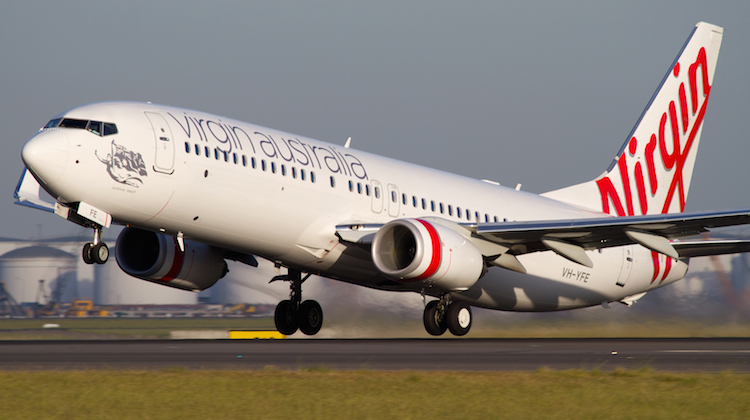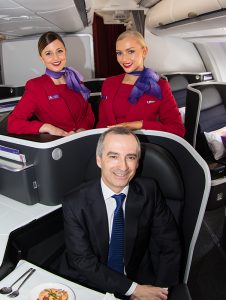
Virgin Australia says it has reached its target of securing 30 per cent of its domestic revenue from the corporate and government travel sector.
The airline said in its full year results presentation released on Friday that its domestic flying managed to grow its share of that high-yielding part of the market in 2015/16, with revenue from corporates and government travel “at its highest level ever”.
Further, revenue from this sector exceeded its 2017 financial year target of 30 per cent of total domestic revenue in the final three months of 2015/16.
“These results were delivered in a challenging operating environment affected by subdued consumer demand, the downturn of the resources sector and uncertainty around the economy and political events,” Virgin chief executive John Borghetti said in a statement.
“Strategic capacity reductions were made in line with reduced demand, particularly on regional routes.”
Virgin’s domestic business posted underlying earnings before interest and tax (EBIT) of $162 million in 2015/16, up 46 per cent from $111.1 million in the prior corresponding period. The airline said yields were up 3.4 per cent, while capacity measured by available seat kilometres was down 0.6 per cent.
Meanwhile, its international flying remained in the red, albeit with a reduced loss of $48.8 million compared with a loss of $68.9 million a year earlier. Yields declined 3.3 per cent in the year. Virgin was targeting a return to profitability for its international network by the end of 2016/17.
The performance of Tigerair Australia continued to improve in 2015/16, with the low-cost carrier posting full year underlying EBIT of $2.2 million, up from a loss of $37.1 million a year ago. The airline has turned a profit a year earlier than was targeted when Virgin took full ownership of the airline in 2014.
There was also growth at Velocity Frequent Flyer, where underlying EBIT rose 72 per cent to $139.7 million. The program had 6.3 million members at June 30 2016, representing an increase of about 20 per cent over the previous 12 months.
And Virgin’s cargo business, which was launched in 2015 and recently began services with dedicated freighter aircraft, had signed up more than 100 accounts, including an exclusive five-year contract with TNT.

As was previously announced on July 28, Virgin posted a $224.7 million statutory net loss for the 12 months to June 30 2016, compared with a statutory loss of $93.8 million in the prior corresponding period.
The result included one-off charges and restructuring costs totalling $440.5 million, due mainly to previously announced fleet changes such as the removal of Embraer E190s and ATR turboprops and the transition of Tigerair Australia from an all-Airbus A320 operator to the Boeing 737 over the next three years.
“While there are costs associated with implementing these activities and initiatives, these are outweighed by the significant, ongoing future savings that will be delivered,” Borghetti said in a statement.
“The group remains on track to exceed its existing target of $1.2 billion in cumulative cost savings by the end of the 2017 financial year.
“Additionally, the group is targeting net free cash flow savings increasing to $300 million per annum (annualised run rate) by the end of the 2019 financial year through the Better Business program.”
“The group enters the 2017 financial year with a strong strategic shareholder base and new opportunities for further revenue growth, including the proposed strategic alliance with HNA. The alliance will provide direct access to China, Australia’s fastest growing and most valuable inbound travel market.
“As a result of these actions, the Group is in a better position to achieve its goals and deliver long-term growth and shareholder value”.
Moreover, the company was targeting improving operating efficiencies in crew and ground operations, as well as in maintenance, engineering, procurement and its supply chain.
However, Virgin declined to offer any financial guidance for the year ahead.
“Based on current business performance, the Group’s positive momentum is expected to continue. However, due to market uncertainty, we are unable to provide further detail at this time,” Borghetti said.
The company said it expected to book restructuring charges of between $100 million and $186 million during the 2017, 2018 and 2019 financial years.
Underlying profit before tax, which does not include one-off charges and was regarded as the best indication of financial performance, came in at $41 million for 2015/16, representing a return to profitability after the underlying loss of $49 million in the prior year.
The airline group grew revenue 5.7 per cent to $5.02 billion in 2015/16, with airline passenger revenue rising to $4.19 billion, from $4 billion previously.
Cost per available seat kilometre (CASK) excluding fuel fell 1.9 per cent in 2015/16, Virgin said.




